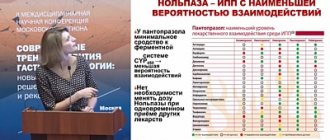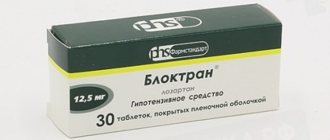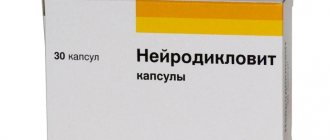Indications
Dexalgin 25 is used to relieve pain of various origins (for example, with renal colic, toothache, neuralgia, radiculitis, as well as sciatica, with algodismenorrhea, in the event of post-traumatic and postoperative pain, pain with bone metastases).
Dexalgin 25 is indicated for the symptomatic treatment of both acute and chronic inflammatory, inflammatory-degenerative, and metabolic diseases of the musculoskeletal system (in the case of spondyloarthritis, rheumatoid arthritis, osteochondrosis and osteoarthritis).
In these cases, Dexalgin 25 is prescribed for pain relief and as an anti-inflammatory agent.
Contraindications
Contraindication is hypersensitivity to dexketoprofen or to the components of the drug, as well as to other NSAIDs.
The presence of peptic ulcer of the stomach and duodenum in the acute phase, if there is a history of gastrointestinal bleeding, as well as in cases of other active bleeding (for example, if intracranial bleeding is suspected), with anticoagulant therapy, hemorrhagic diathesis and other coagulation disorders.
Not used in cases of exacerbation of inflammatory bowel diseases (Crohn's disease, ulcerative colitis).
In severe liver dysfunction (10-15 points on the Child-Pugh scale), as well as in severe or moderate renal dysfunction (with creatinine clearance less than 50 ml/min).
Dexalgin 25 is contraindicated in complete or incomplete combination of bronchial asthma, recurrent polyposis and intolerance to acetylsalicylic acid or other NSAIDs (also in history).
In case of severe heart failure, after coronary artery bypass grafting.
Dexalgin 25 is not used for the treatment of children under 18 years of age, as well as during pregnancy and breastfeeding.
Use with caution if you have a history of allergic reactions; for blood clotting disorders; in the presence of systemic lupus erythematosus, as well as mixed connective tissue diseases; with simultaneous use of other drugs; in a state of severe hypovolemia; with existing coronary heart disease; for cerebrovascular diseases.
Caution is required in the presence of diabetes mellitus or hyperlipidemia, in the case of peripheral arterial diseases, and also if there is a history of information about the development of ulcerative lesions of the gastrointestinal tract; with long-term use of NSAIDs. Use with caution when smoking, alcoholism, and in old age (after 65 years).
Indications and contraindications
What does Dexalgin 25 help with? The indications are extensive, the main one being pain of almost any origin. The medicine helps with:
- painful menstruation (periodic pain in women, algomenorrhea);
- rheumatoid arthritis in exacerbation, with chronic arthritic pain;
- psoriatic arthritis;
- acute gout;
- deforming arthrosis;
- protrusion of intervertebral discs;
- osteochondrosis, muscular-tonic syndrome;
- cervicalgia;
- spondyloarthritis.
You can use the drug for toothache. It quickly relieves inflammation after tooth extraction or invasive manipulations on the gums and jaws.
Dexalgin 25 helps well against migraines and other types of headaches.
What can you take the drug against or give it injections?
In women, injections of medication are prescribed for acute inflammatory diseases of the genital area (salpingo-oophoritis, endometritis, colpitis), and for pain due to ectopic pregnancy.
Dexalgin will relieve pain from any injury.
Contraindications include:
- peptic ulcer;
- heart failure (decompensation);
- Crohn's disease;
- bronchial asthma;
- lactation;
- pregnancy;
- severe renal failure;
- age up to 18 years.
You cannot treat with the drug if you have hypersensitivity, including to analogues of origin. It is also prohibited to take more than a single dose if there is a tendency to increased tissue bleeding.
Mode of application
Dexalgin 25 is taken orally with meals.
The dosage depends on the intensity of the pain syndrome, with the recommended dose for adults being 12.5 mg (1/2 tablet) every 4-6 hours or 25 mg (1 tablet) every 8 hours. The maximum daily dose is 75 mg.
In patients of the older age group, as well as in patients with impaired liver and/or kidney function, use
Dexalgin 25 is started with lower doses, and the maximum daily dose is 50 mg.
It should be remembered that Dexalgin 25 is not intended for long-term therapy; the course of treatment should not exceed 3-5 days.
What kind of medicine is Dexalgin 25?
The drug Dexalgin belongs to the group of non-steroidal anti-inflammatory drugs (NSAIDs). Like other drugs in the group, Dexalgin has a powerful analgesic and anti-inflammatory effect. The active substance in the composition is dexketoprofen tromethanol, it is a derivative of propionic acid, a modern NSAID.
The medicine is available in the following forms:
- in ampoules for intramuscular, intravenous administration;
- in coated tablets.
Packs contain 5 ampoules
for injections (2 ml), 50, 30, 20 tablets, 10 pcs./blister.
A milliliter of solution contains 36.9
mg of active ingredient (equal to 25 mg of dexketoprofen).
The auxiliary components are water, sodium chloride, sodium hydroxide, ethanol. The additional components in the tablets are:
- glycerol;
- corn starch;
- cellulose;
- sodium carboxymethyl starch;
- titanium dioxide;
- hypromellose;
- propylene glycol;
- macrogol 6000.
The price of the drug is about 480 rubles / 5 ampoules
, 260 RUR/10 tablets. It is sold in all pharmacy chains and state pharmacies.
Side effects
When using Dexalgin 25, various side effects may occur:
- Blurred vision and occasional tinnitus may occur.
- Very rarely, neutropenia and thrombocytopenia are possible.
- Infrequently, headache, dizziness, insomnia, or drowsiness may occur; Paresthesia is rarely possible.
- From the cardiovascular system: infrequently, a feeling of heat and redness of the skin may occur; Extrasystole rarely appears, blood pressure may increase, and cases of tachycardia or decreased blood pressure are very rare.
- From the respiratory system: bradypnea may rarely occur; cases of bronchospasm or shortness of breath are very rare.
- From the gastrointestinal tract: a feeling of nausea or vomiting, dyspepsia and diarrhea, abdominal pain may occur, constipation, flatulence, and dry mouth may occur infrequently. Rarely, erosions and ulcers may occur in the gastrointestinal tract, as well as bleeding from an ulcer or its perforation. Damage to the pancreas is very rare.
- From the liver and biliary tract: rarely, increased activity of liver enzymes may occur and jaundice may appear; very rarely the liver may be affected.
- From the genitourinary system: polyuria may rarely occur; cases of nephritis or nephrotic syndrome are very rare, disturbances in the menstrual cycle in women are rare, and in men, with long-term use, temporary dysfunction of the prostate gland may occur.
- From the musculoskeletal system: rarely, muscle spasms, back pain, and difficulty in the motor function of joints may occur.
- From the skin: infrequently - cases of dermatitis, rash; rarely the appearance of urticaria or acne, as well as sweating; very rarely, cases of severe skin reactions (such as Stevens-Johnson syndrome, Lyell's syndrome), as well as the occurrence of angioedema, allergic dermatitis and photosensitivity are possible.
- Cases of hypo- or hyperglycemia, as well as hypertriglyceridemia, are rare.
- Laboratory findings may (rarely) include ketonuria or proteinuria.
- General disturbances may include (infrequently) fever, fatigue; very rarely there is a possibility of anaphylactic shock and facial swelling.
- Rarely, aseptic meningitis can occur, mainly in patients with systemic lupus erythematosus, as well as mixed connective tissue diseases. Hematological disorders may also appear (purpura, anemia - both aplastic and hemolytic); the likelihood of agranulocytosis and bone marrow hypoplasia is very rare.
Overdose
Symptoms of overdose may include nausea, abdominal pain, headache or dizziness. Insomnia, disorientation, and anorexia may occur.
Treatment of overdose depends on the symptoms that appear. If necessary, gastric lavage and hemodialysis are allowed.
special instructions
Interactions are typical for all NSAIDs.
Undesirable combinations:
- With other NSAIDs, including salicylates in high doses (more than 3 g per day), since when taking several NSAIDs simultaneously, a synergistic effect occurs, which increases the likelihood of gastrointestinal bleeding and ulcerative phenomena.
- With oral anticoagulants, heparin, in doses higher than prophylactic, as well as with ticlopidine: the risk of bleeding increases due to inhibition of platelet aggregation and damage to the gastrointestinal mucosa.
- With lithium preparations: NSAIDs can increase the concentration of lithium in the blood, up to toxic levels; therefore, monitoring this indicator is necessary both when using or changing the dose, and after discontinuation of NSAIDs.
- With methotrexate in high doses (15 mg per week or more): during NSAID therapy, its renal clearance decreases and, as a consequence, the hematological toxicity of methotrexate increases.
- With hydantoins and sulfonamides: the risk of toxic effects of these drugs increases.
Combinations requiring caution
- With diuretics, ACE inhibitors: in this case, the use of NSAIDs can cause the development of acute renal failure in patients with reduced water balance, since with a decrease in PG synthesis, glomerular filtration may decrease. NSAIDs can also reduce the therapeutic effect of some antihypertensive drugs.
- With low-dose methotrexate (less than 15 mg per week): the use of NSAIDs reduces the renal clearance of methotrexate, which in turn increases its hematological toxicity. In this regard, during the period of joint therapy, weekly blood cell counts are recommended, especially in the first week. In case of existing renal dysfunction, even to a mild degree, as well as in patients of the older age group, careful monitoring is necessary.
- The likelihood of developing bleeding from the gastrointestinal tract increases with the simultaneous use of NSAIDs and serotonin reuptake inhibitors (for example, fluoxetine, citalopram, sertraline), and oral glucocorticoids.
- With pentoxifylline: when used together, the likelihood of bleeding also increases.
- Constant monitoring of blood clotting time is necessary.
- With zidovudine: There is a potential for increased risk of toxic effects on red blood cells, which in turn are due to effects on reticulocytes, which may lead to anemia one week after starting NSAID use. In this case, after one or two weeks of therapy, a blood test and reticulocyte count are required.
- With sulfonylurea derivatives: NSAIDs have the ability to enhance the hypoglycemic effect of sulfonylureas, displacing it from sites of binding to plasma proteins.
- With low molecular weight heparin preparations: due to an increased likelihood of bleeding.
Combinations to consider
- With β-blockers: NSAIDs, by inhibiting the synthesis of PG, are thereby able to reduce the hypotensive effect of β-blockers.
- With cyclosporine and tacrolimus: NSAIDs may increase nephrotoxicity, which is mediated by the action of renal PGs. During concomitant therapy, monitoring of renal function is required.
- With thrombolytics: the likelihood of bleeding increases.
- With probenecid: plasma concentrations of NSAIDs may increase, this may be due to the inhibitory effect of probenecid on renal tubular secretion and/or conjugation with glucuronic acid, in which case it is necessary to adjust the NSAID dosage if necessary.
- With cardiac glycosides: there is a possibility that NSAIDs may increase plasma concentrations of glycosides.
- With mifepristone: the use of NSAIDs is not recommended earlier than 8-12 days after stopping mifepristone, since theoretically there is a possibility of a change in the effectiveness of mifepristone due to the influence of PG synthesis inhibitors.
- With quinolones: Based on experimental animal studies, there is a risk of seizures when using NSAIDs in conjunction with high-dose quinolone therapy.
Like other NSAIDs, Dexalgin 25 can increase the concentration of creatinine and nitrogen in plasma; Dexalgin 25 can also have a side effect on the urinary system, and there is a possibility of interstitial nephritis or glomerulonephritis, as well as papillary necrosis, nephrotic syndrome and acute renal failure.
During therapy with Dexalgin 25, a slight transient increase in liver parameters and a significant increase in the activity of AST and ALT in the serum sometimes occur. In this regard, in patients of the older age group it is necessary to monitor the functions of the liver and kidneys. In case of a significant increase in indicators, it is recommended to discontinue the use of Dexalgin 25.
Dexketoprofen therapy can hide the symptoms of infectious diseases. If you suspect an infection or if your condition worsens while using Dexalgin 25, you should immediately consult a doctor.
When using Dexalgin 25, there is a possibility of a feeling of drowsiness, and dizziness may also occur, while the patient’s ability to concentrate and the speed of psychomotor reactions may decrease in the first hours after taking the drug.
In this regard, during therapy with Dexalgin 25, caution is required when driving vehicles or during activities that require concentration and speed of psychomotor reactions.
Dexalgin film-coated tablets 25 mg 10 pcs
Undesirable side effects can be minimized by using the drug in the lowest effective dose with the minimum duration of use necessary to relieve pain.
The risk of complications from the gastrointestinal tract increases in patients with a history of ulcerative lesions of the gastrointestinal tract, in elderly patients, with an increase in the dose of NSAIDs; therefore, the use of Dexalgin® 25 in this category of patients should begin with the lowest recommended dose.
For patients in the above categories, as well as patients who require simultaneous use of low doses of acetylsalicylic acid or other drugs that increase the risk of gastrointestinal complications, additional simultaneous use of gastroprotectors (misoprostol or proton pump blockers) is recommended.
In patients simultaneously taking antiplatelet agents or anticoagulants, glucocorticosteroids, the risk of gastrointestinal bleeding also increases.
Patients with gastrointestinal disorders or a history of gastrointestinal diseases should be under close medical supervision. If gastrointestinal bleeding or ulcerative lesions occur, use of Dexalgin® 25 should be discontinued.
The drug Dexalgin ®25 should be used with caution in patients with a history of gastrointestinal diseases (ulcerative colitis, Crohn's disease), since exacerbation of these diseases is possible.
All NSAIDs can inhibit platelet aggregation and prolong bleeding time by inhibiting prostaglandin synthesis. In this regard, the use of Dexalgin® 25 in patients simultaneously taking drugs that affect the hemostatic system, such as warfarin, coumarin derivatives and heparins, is not recommended.
Like other NSAIDs, Dexalgin® 25 can lead to increased concentrations of creatinine and nitrogen in the blood plasma. Like other prostaglandin synthesis inhibitors, Dexalgin® 25 may have side effects on the urinary system, which can lead to the development of glomerulonephritis, interstitial nephritis, papillary necrosis, nephrotic syndrome and acute renal failure. Caution should be exercised when using the drug in patients concomitantly using diuretics and patients who may develop hypovolemia, due to the increased risk of nephrotoxicity.
As with the use of other NSAIDs, during therapy with Dexalgin® 25, a slight transient increase in the activity of liver enzymes may be observed. In elderly patients, monitoring of liver and kidney function is necessary. In case of a significant increase in the corresponding indicators, the use of the drug Dexalgin® 25 should be discontinued.
Like other NSAIDs, dexketoprofen may mask the symptoms of infectious diseases. If signs of infection or deterioration in health are detected while using the drug Dexalgin® 25, the patient should immediately consult a doctor.
The drug can cause fluid retention in the body, therefore, in patients with arterial hypertension, renal and/or heart failure, Dexalgin® 25 should be used with extreme caution. If the condition worsens, the use of Dexalgin® 25 should be discontinued.
In patients with uncontrolled arterial hypertension, coronary artery disease, congestive heart failure, peripheral arterial disease and/or cerebrovascular disease, the drug should be used with caution. A similar approach is applicable to patients with risk factors for developing cardiovascular diseases (arterial hypertension, hyperlipidemia, diabetes mellitus, smoking).
Caution must be exercised when prescribing Dexalgin® to patients with a history of cardiovascular disease, especially patients with heart failure, due to the possible risk of progression.
Clinical studies and epidemiological data suggest that NSAIDs, especially in high doses and with long-term use, may lead to a small risk of acute myocardial infarction or stroke. There is insufficient data to exclude the risk of these events when using dexketoprofen.
Elderly patients are especially susceptible to adverse reactions when using NSAIDs, including the risk of life-threatening gastrointestinal bleeding and perforation, and decreased renal, liver, and cardiac function. When using the drug Dexalgin® 25 in this category of patients, proper clinical monitoring is necessary.
There is evidence of rare cases of skin reactions (such as exfoliative dermatitis, Stevens-Johnson syndrome, toxic epidermal necrolysis) with the use of NSAIDs. At the first manifestations of a skin rash, damage to the mucous membranes or other signs of an allergic reaction, you should immediately stop taking Dexalgin® 25 and consult a doctor.
Impact on the ability to drive vehicles and other mechanisms
Due to the possible occurrence of dizziness and drowsiness during the period of use of the drug Dexalgin® 25, the ability to concentrate and the speed of psychomotor reactions in patients may decrease, especially in the first hour after administration. Therefore, while using the drug Dexalgin® 25, care should be taken when driving vehicles and engaging in potentially hazardous activities that require increased concentration and speed of psychomotor reactions.



